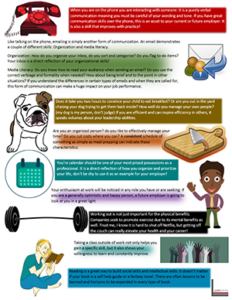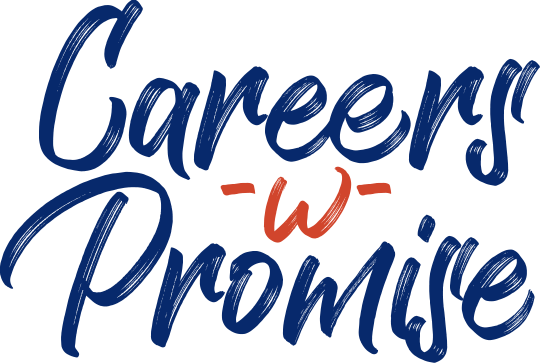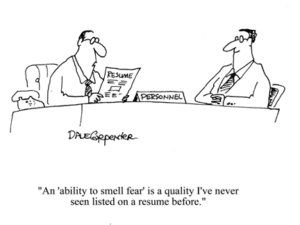As you should know now, based on my first post, I work for a company called Learnovation. This company has a ridiculous affinity for people’s skills…and I am not talking your run-of-the-mill “…is proficient in word, excel, outlook…” type skills, I’m talking about the skills you gain every day, all of those little mundane things you do that just become natural and mechanical. Those are your money making skills. I can tell you’re trying to think of the specific skills I am talking about so let me help a little. Step outside of yourself for a minute a-la “Ghost” (Patrick Swayze and Demi Moore…can I get an AMEN!) take a look at what you do everyday from the moment you wake up to the time you go to sleep. Find your patterns! Do you answer phone calls at work? Do you check your email? Do you wrangle up a child (or fur child) and successfully keep them alive and maybe even thriving? Do you meal prep so that you can just grab a container out of the fridge and dash? Do you Check your calendar for meetings? Do you walk into work with a smile on your face? Do you go to the gym when you get home? Do you rush to a class? Do you read a few articles or book before bed? Chances are you do at least one or almost all of these things.
You: Abby, How do these simple daily tasks add up to my money making skills?
Me: I am so glad you asked! Take a look to your right and click on that picture for the details…
You: Abby, it can’t really be that easy can it?
Me: of course it can. now lets steer away from this goofy conversation and let me get back to my paragraphs.
Transferable skills don’t just happen over night, they are an accumulation of daily practices, tasks, and activities. Sometimes you are consciously working on these tasks and sometimes, they seem to appear out of thin air. So how do you document these transferable skills and bend them to your will?
Cue the Career Portfolio!!!
I won’t go into extreme detail here on the career portfolio because that information is already detailed for you on the career portfolio page of this site. What I will do is give you a little insight on how you can help yourself grow and boost your career. When recruiters are looking at resumes nowadays, they are looking at what is on that piece of paper in front of them and not much further than that. You can send out resumes till you fingers go numb (been there done that) but not a single one of those resumes is going to land on HR’s desk unless you find a way to stick out. A vast majority of professionals have a degree now and employers are realizing that just because you have a diploma, doesn’t mean you have the skills to succeed right out of school. The diploma is falling by the wayside and you have to catch up. That’s where being able to tangibly document your skills will come into play. YOU know what you’re good at, but how do you PROVE it? There is this wonderful resource that I had never heard of until I was brought on at Learnovation®. “The O*NET program provides comprehensive occupational descriptions and data for use by job seekers, workforce development offices, human resources professionals, students, researchers, and others.” I have no doubt that the majority of my readers have never heard of O*NET either. If you have, then get out there and tell more people. This particular resource on O*NET will help you navigate the different skills you can acquire and how to classify them. If you explore the website a bit, it will provide you with some wonderful information on job classification in regards to skills and abilities as well as education. If you don’t want to scour through days of content online, all 3 of our career portfolio books have a basis in O*NET and can help you discern your skills in a much easier, more user friendly format.
As you should know now, based on my first post, I work for a company called Learnovation. This company has a ridiculous affinity for people’s skills…and I am not talking your run-of-the-mill “…is proficient in word, excel, outlook…” type skills, I’m talking about the skills you gain every day, all of those little mundane things you do that just become natural and mechanical. Those are your money making skills. I can tell you’re trying to think of the specific skills I am talking about so let me help a little. Step outside of yourself for a minute a-la “Ghost” (Patrick Swayze and Demi Moore…can I get an AMEN!) take a look at what you do everyday from the moment you wake up to the time you go to sleep. Find your patterns! Do you answer phone calls at work? Do you check your email? Do you wrangle up a child (or fur child) and successfully keep them alive and maybe even thriving? Do you meal prep so that you can just grab a container out of the fridge and dash? Do you Check your calendar for meetings? Do you walk into work with a smile on your face? Do you go to the gym when you get home? Do you rush to a class? Do you read a few articles or book before bed? Chances are you do at least one or almost all of these things.
You: Abby, How do these simple daily tasks add up to my money making skills?
Me: I am so glad you asked! Take a look below and click on the infographic for the details…
You: Abby, it can’t really be that easy can it?
Me: of course it can. now lets steer away from this goofy conversation and let me get back to my paragraphs.
Transferable skills don’t just happen over night, they are an accumulation of daily practices, tasks, and activities. Sometimes you are consciously working on these tasks and sometimes, they seem to appear out of thin air. So how do you document these transferable skills and bend them to your will?
Cue the Career Portfolio!!!
I won’t go into extreme detail here on the career portfolio because that information is already detailed for you on the career portfolio page of this site. What I will do is give you a little insight on how you can help yourself grow and boost your career. When recruiters are looking at resumes nowadays, they are looking at what is on that piece of paper in front of them and not much further than that. You can send out resumes till you fingers go numb (been there done that) but not a single one of those resumes is going to land on HR’s desk unless you find a way to stick out. A vast majority of professionals have a degree now and employers are realizing that just because you have a diploma, doesn’t mean you have the skills to succeed right out of school. The diploma is falling by the wayside and you have to catch up. That’s where being able to tangibly document your skills will come into play. YOU know what you’re good at, but how do you PROVE it? There is this wonderful resource that I had never heard of until I was brought on at Learnovation®. “The O*NET program provides comprehensive occupational descriptions and data for use by job seekers, workforce development offices, human resources professionals, students, researchers, and others.” I have no doubt that the majority of my readers have never heard of O*NET either. If you have, then get out there and tell more people. This particular resource on O*NET will help you navigate the different skills you can acquire and how to classify them. If you explore the website a bit, it will provide you with some wonderful information on job classification in regards to skills and abilities as well as education. If you don’t want to scour through days of content online, all 3 of our career portfolio books have a basis in O*NET and can help you discern your skills in a much easier, more user friendly format.

